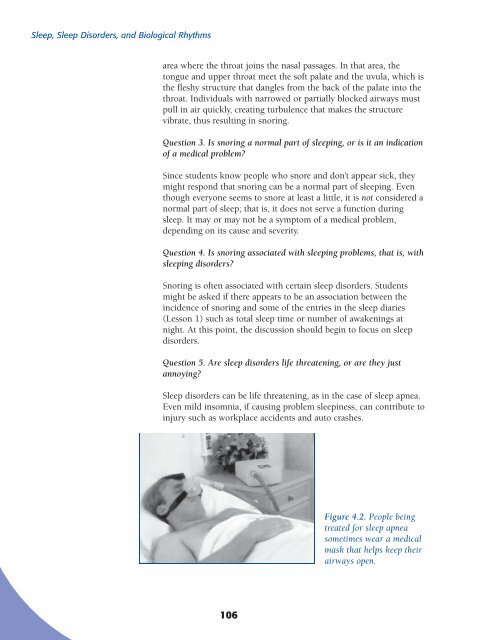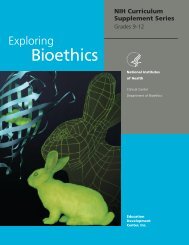Biological - NIH Office of Science Education - National Institutes of ...
Biological - NIH Office of Science Education - National Institutes of ...
Biological - NIH Office of Science Education - National Institutes of ...
Create successful ePaper yourself
Turn your PDF publications into a flip-book with our unique Google optimized e-Paper software.
Sleep, Sleep Disorders, and <strong>Biological</strong> Rhythms<br />
area where the throat joins the nasal passages. In that area, the<br />
tongue and upper throat meet the s<strong>of</strong>t palate and the uvula, which is<br />
the fleshy structure that dangles from the back <strong>of</strong> the palate into the<br />
throat. Individuals with narrowed or partially blocked airways must<br />
pull in air quickly, creating turbulence that makes the structure<br />
vibrate, thus resulting in snoring.<br />
Question 3. Is snoring a normal part <strong>of</strong> sleeping, or is it an indication<br />
<strong>of</strong> a medical problem?<br />
Since students know people who snore and don’t appear sick, they<br />
might respond that snoring can be a normal part <strong>of</strong> sleeping. Even<br />
though everyone seems to snore at least a little, it is not considered a<br />
normal part <strong>of</strong> sleep; that is, it does not serve a function during<br />
sleep. It may or may not be a symptom <strong>of</strong> a medical problem,<br />
depending on its cause and severity.<br />
Question 4. Is snoring associated with sleeping problems, that is, with<br />
sleeping disorders?<br />
Snoring is <strong>of</strong>ten associated with certain sleep disorders. Students<br />
might be asked if there appears to be an association between the<br />
incidence <strong>of</strong> snoring and some <strong>of</strong> the entries in the sleep diaries<br />
(Lesson 1) such as total sleep time or number <strong>of</strong> awakenings at<br />
night. At this point, the discussion should begin to focus on sleep<br />
disorders.<br />
Question 5. Are sleep disorders life threatening, or are they just<br />
annoying?<br />
Sleep disorders can be life threatening, as in the case <strong>of</strong> sleep apnea.<br />
Even mild insomnia, if causing problem sleepiness, can contribute to<br />
injury such as workplace accidents and auto crashes.<br />
Figure 4.2. People being<br />
treated for sleep apnea<br />
sometimes wear a medical<br />
mask that helps keep their<br />
airways open.<br />
106

















